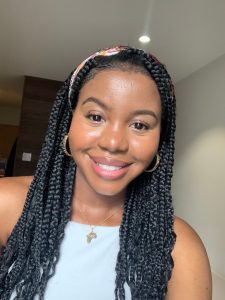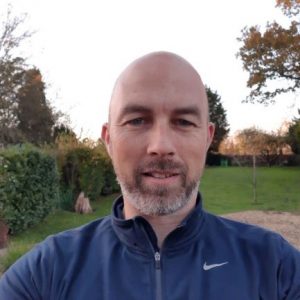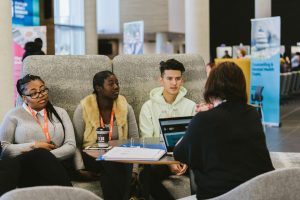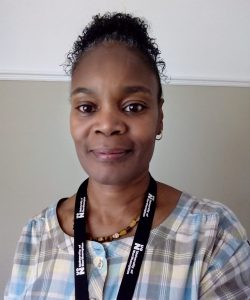Our team recently presented a poster at the University’s Learning and Teaching Conference. Check out the poster below, which includes some of the findings from our initial analysis.
Author: Michelle
Shabina: student researcher

My name is Shabina Shaikh and I am from Mumbai, India. I am doing my post-graduate studies in Child Adolescent and Mental Health and am currently working as research assistant on BAME project. As research assistant this is my first job in UK. When I applied for this role I was new to this country had no idea what is meant by ‘diversity’ and why there is so much talk about this subject. At interview I was asked how much do I know about diversity? My answer was I don’t know much about it, neither I have experienced anything so far.
This project gave me an insight on this sensitive subject; it is like on job training. As a student I am exposed to the new culture, new people, loads of up and downs in day-to-day life, including experiencing a pinch of diversity. And as a member of project team, I learn and understand this subject in depth. The project aims to create awareness about black student attainment at the university. So far, it’s been a fruitful journey. The project group comprises highly intellectual and experienced team members who are always supportive. During scheduled meetings we discuss the project updates, share our inputs, plan further course of action with defined deadlines.
Though it’s challenging to balance study & project work it’s worth all the difficulties. This project not only gave me an insight of what diversity is all about, but it has also groomed me on actual research work. Reading articles, writing reviews, analyzing data and statistics.
From the time I have landed in this country till now I don’t hesitate to accept and write that my perception about this subject is changed. Diversity is not something which is open and loud it’s something that communicates with you silently. You can feel it without even someone telling you anything. Including but not limited to the difference in treatment of white students and other international students. The main issue what we international students face is a language barrier. As an international student English is not our first language. Even if we know our subject it’s difficult for us to put it on paper. This was reflected in getting poor marks on assignments compared to the white students. The international student representatives are all white. International students look forward to seeing some familiar faces to share and discuss issues.
To sum it up, the journey so far is very eye opening. I am happy to be part of this project. Along with new learning I am sure this work experience will have a positive impact on my career opportunities, as I plan to work and grow in the research area. The idea of storytelling, taking feedback from the black nursing students is a very sensitive subject but this is need of the hour. Not only black students – but every international student is also the victim of diversity in some or other form. There is a huge difference and a gap between the claim we treat everyone equally then to practice it. High time we need to fill in this gap.
What’s it like being a Research Assistant when you’re a student at the University?
Hello my name is Doreen and I am a third-year nursing student currently working as a Research Assistant on the Black Attainment Project. In this post, I will be discussing what my role entails, the reasons I applied to be a research assistant, the knowledge and skills I have gained, why the project is important and what I look forward to regarding the project
name is Doreen and I am a third-year nursing student currently working as a Research Assistant on the Black Attainment Project. In this post, I will be discussing what my role entails, the reasons I applied to be a research assistant, the knowledge and skills I have gained, why the project is important and what I look forward to regarding the project
What does my role involve?
I am five months into my new role and I have gained a significant amount of knowledge regarding research. At present my responsibilities have involved attending meetings with the project team to receive updates on everyone’s progress, meeting with our project mentor, learning how to search for literature, facilitating focus groups for data collection, analysing the data and reviewing literature to support our final write up. I am also involved in encouraging student involvement in the project through sharing information on social media.
Why did I apply for the job?
I decided to apply for this position for a number of reasons. Firstly, being able to explore the lived experience of black nursing students at the university has allowed me to understand my own experience throughout my nursing degree whilst also creating a platform for other black students to have their voices heard. Secondly, as I prepare to enter the world of nursing I have been exploring various nursing pathways I would like to follow and research is one I am considering. Therefore, being involved in the project has given me insight into what research involves.
What have I learnt so far?
My organisational and time management skills have been put to the test whilst working as a research assistant. I have had to balance fulfilling my responsibilities as a student which include placement, assignments and attending lectures whilst also carrying out tasks for the project. Learning to prioritise my duties, sharing responsibilities and being honest with the team when I am unable to complete a task has helped with managing the workload.
In terms of learning opportunities, the team is comprised of people with expertise in different areas such as statistics, the process of carrying out research etc. Therefore, working alongside them has created great opportunities to expand my knowledge on research. I have gained skills associated with data collection through facilitating the focus groups and I have learnt how to analyse qualitative data using thematic analysis. My confidence has also developed within the last five months of working on the project. I feel confident sharing my thoughts and putting myself forward to participate in different tasks.
Why is the project important?
The data we have looked at shows inequalities in attainment for black students. The aim of this project is to improve black student attainment and create a better sense of belonging through understanding the existing barriers experienced by black students whilst at university.
What do I look forward to?
The next stage of the project is to collect stories from black students about their experience throughout university. I look forward to reading the stories and being able to assist the team with putting together resources that will be implemented in the nursing curriculum and potentially used in marketing.
December 2021: An update from our team member, Tim!

Our institutional Access and Participation Plan (APP), focusses our attention on closing the performance gaps that exist within different student cohorts at UON at the four stages of the student lifecycle; Access, Continuation, Attainment (Award) and Graduate Outcomes. This year, one of the Learning Enhancement Innovating Projects priority funding areas is to address the objectives within the APP. Our Improving Black Attainment by Using Personal Stories project will very much support the attainment (award) objective within the APP which focused on narrowing the black/white student attainment (award) gap to 0% by 2025. Using student stories to identify personal situations and experiences will enable us to assess how, amongst other things, students felt a sense of belonging and identify at UON and how this has impacted on their studies and outcomes. One of the exciting aspects about this research is how our findings could impact on so many students and programmes at our university. The potential impact on student outcomes and engagement is huge and will certainly support the closing of our attainment gap.
Please click on the link for further information: https://www.northampton.ac.uk/wp-content/uploads/2019/09/access-and-participation-plan-2020-2025.pdf
November: Reviewing University data
Today’s project meeting has focused on the data that is routinely collected by the University about students on our courses. The data we are using is all anonymised at source, so we can’t trace back to individual students, which is an important element of ensuring that we research ethically. In looking at the data that Jackie has analysed so far, we realised that one area that we don’t collect data on is in relation to students’ first language. We collect data on whether our students lived in the UK or abroad before they started their studies, ethnicity, and other demographic information such as age and gender. This is the first of the potential themes that has come out of the data, and that might be one area for a story to be developed on. We will liaise with our peer researchers when they are recruited to explore the data with them, and see what other themes they (and we!) identify. Exciting times! Watch this space for an update on recruitment of our student peer researchers…

October 2021: getting started
Hello everyone,
We are excited about being able to speak to you about our project and sharing some information about ourselves and how the project came into being.
This project came unexpectedly as we were planning a teaching session in May 2021 and here we are now. Before we tell you about the project here is a little about us.
About us
 Patricia: I have worked at the University of Northampton for 5yrs and in the field of nursing for over 20yrs in different areas settling in health visiting and becoming a lead practice teacher, and I am surprised to say nearing another decade. I am passionate about quality, learning, attainment and people reaching their full protentional. During a completed MSc module in influencing change I focused on developing a pathway to support students writing skills, which was born from my experience of supporting referred students. I enjoy meeting with students and supporting them on their journey, yet I tend to shy away from leading and being in the forefront. So, this project will be stretching me, taking me out of my comfort zone and exposing me to new skills, knowledge and interests.
Patricia: I have worked at the University of Northampton for 5yrs and in the field of nursing for over 20yrs in different areas settling in health visiting and becoming a lead practice teacher, and I am surprised to say nearing another decade. I am passionate about quality, learning, attainment and people reaching their full protentional. During a completed MSc module in influencing change I focused on developing a pathway to support students writing skills, which was born from my experience of supporting referred students. I enjoy meeting with students and supporting them on their journey, yet I tend to shy away from leading and being in the forefront. So, this project will be stretching me, taking me out of my comfort zone and exposing me to new skills, knowledge and interests.
 Julia: I am also a nurse by background and have been at the University for around 17 years. During that time, I have been a course member or lead on undergraduate and post graduate health programmes. I also spent several years working on the orientation and adaptation programmes for overseas nurses. My MSc dissertation explored the experiences of IRNs (internationally recruited nurses) coming to work in the UK and I have published some articles in this area. I have been involved in several projects including HEE funded work and collaboratively with other Universities but would describe myself as an enthusiastic fledging researcher. I joined this project after being inspired by Patricia’s passion for improving educational attainment of students from BAME backgrounds; and humbled by the determination to succeed of some of my personal students. This is an area where we believe that we can really make a difference and I am excited to be involved.
Julia: I am also a nurse by background and have been at the University for around 17 years. During that time, I have been a course member or lead on undergraduate and post graduate health programmes. I also spent several years working on the orientation and adaptation programmes for overseas nurses. My MSc dissertation explored the experiences of IRNs (internationally recruited nurses) coming to work in the UK and I have published some articles in this area. I have been involved in several projects including HEE funded work and collaboratively with other Universities but would describe myself as an enthusiastic fledging researcher. I joined this project after being inspired by Patricia’s passion for improving educational attainment of students from BAME backgrounds; and humbled by the determination to succeed of some of my personal students. This is an area where we believe that we can really make a difference and I am excited to be involved.
Why we wanted to do the project?
There has been a change in the demographic trend of the student nursing population, with UON successfully recruiting an increasing number of BAME students to nursing programmes. The black/black British group has seen the largest increase in the past 5yrs with the percentage of black students from adult nursing increasing from approximately 26% to 40%. The student attainment figures however show a persistent gap, this can be seen for example with the percentage of first-class degree’s awarded. In 2015/16 28.6% of black students obtained a first-class degree compared to 40% of white students and in 2019/20 these figures were 24.6% and 47.4% respectively. Despite the increase in diversity, these figures would suggest that strategies are needed to address inequalities and investigate why these disparities occur.
Why personal stories?
Personal stories enhance self-identity and an understanding of the individual’s experiences. This project aims to improve BAME student attainment through addressing unconscious bias and creating inclusive classrooms with the use of personal stories. The use of the collection of authentic individualised stories within teaching and marketing will create opportunities to talk directly about race, racism and the attainment gap. This will facilitate insight into BAME students’ lived experience and the impact of this on attainment and foster a sense of belonging.
Where we are now?
Research shows that experiences within groups differ according to which minority group they are in with disparities within broad ethnic groupings. For this reason, we have decided to focus our work on the Black ethnic minority groups as opposed to BAME in general. This was a change from the original intention. The number of Black students has seen the greatest increase over the last 5 years and so will provide the focus for this work.
We are now in the process of completing the ethics application form and developing the job specification for recruiting 2 students to be co-creators on the project.
Our first steps…
We have been awarded funding! We are really excited to be working on this project, and we can’t wait to recruit our student co-developers. We’ll be liaising with our Human Resources team to get this process underway. At the same time we are getting started on our application for ethics approval – busy busy!
